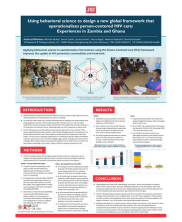Despite widespread recognition that person-centered care (PCC) underpins high-quality HIV services, identifying approaches to operationalize PCC remains a challenge. JSI conducted a desk review and co-creation workshops with 39 colleagues from diverse geographies and health areas to develop a PCC framework grounded in behavioral science.
The PCC framework was recently applied to two prevention approaches in two countries; PrEP in Zambia (USAID DISCOVER-Health) and ART in Ghana (USAID Strengthening the Care Continuum). The USAID DISCOVER-Health and USAID Strengthening the Care Continuum projects implemented interventions across domains and socio-ecological levels in Zambia and Ghana. At individual and community levels, DISCOVER engaged peer mentors and recruited/trained community health workers to increase PrEP uptake. Interventions at the facility level included locating clinics according to client preference and offering triple case management for children and caregivers. In Ghana, we implemented interventions at the facility and individual levels that included new treatment and medication refill sites to increase client access, and walk-in ART service provision. Applying behavioral science to operationalize interventions using the PCC framework improved the uptake of HIV prevention.
In Zambia, gatekeepers (parents, guardians, community leaders, etc) shifted their behavior to become supporters of AGYW choices. Service delivery across the cascade improved because using a behavioral lens uncovered key barriers and facilitators to AGYW accessing care, and thus allowed targeted actions. This newly supportive environment at multiple levels of the PCC framework resulted in an increase in AGYW initiating PrEP from 39% in Q4 2020 to 61% in Q3 2021.
In Ghana, supporting actors (providers, local leaders and media) changed their behavior which encouraged PLHIV to back to care. By June 2021, the average treatment interruption rate reduced to 1% (from 21% in December 2019) in the three intervention zones. Over 10,000 PLHIV whose treatment was interrupted came back to care (October 2019 to March 2023). This is 1.67 times more than the initial identified number of individuals (6,000) whose treatment stopped.
Epidemiological data shows that understanding, and acting on, barriers and facilitators to uptake of health services results in better outcomes. Medicalized approaches to the HIV epidemic have made tremendous progress but also have their limit. Integrating behavioral science-informed approaches, like the PCC framework, offer great potential to help achieve the 95-95-95 targets.
The PCC framework helps practitioners operationalize PCC to transform HIV prevention and treatment strategies conjunctively across socio-ecological levels. It can inform future strategies in Zambia, Ghana, and other countries, and leverage lessons from other health areas where PCC has been applied for HIV program innovation, such as the uptake of new long-acting injectable treatments.
Applying a behavioral lens to improve person-centered outputs and outcomes has the potential to shape the trajectory of HIV care to better match client priorities. This is done through performance improvement loops that deliver superior outcomes to overcome ongoing and new challenges in access to services across the continuum. This PCC approach holds potential to support clients' broader mental and psychosocial wellbeing via services that attend to each client's holistic needs.


